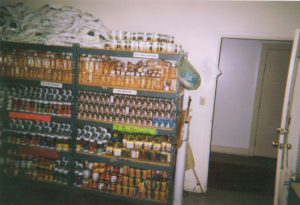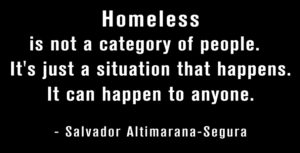Prayer for the Hungry – Number 2
O Heavenly Father
I offer You gratitude for all Your blessings and love which You continually share with parents struggling with underemployment, poor health, insufficient food, transportation challenges.
I ask You, the source of all living things, to protect and guard parents who shop at the pantry.
Help them listen to their children’s needs as they struggle to live a life with insufficient resources… time, money, housing, health care.
Offer the peace which can only come when they know that You are a part of their lives every day.
O Heavenly Father, help them overcome their greatest fear – hunger.
Guide their lives so that no one in their household is hungry.
Encourage them to see the positive aspects of their lives.
Teach them to co-create abundance
Give them the courage to reach out when their needs are overwhelming.
Let them know that they can be secure in their paths.
Teach them to travel through their lives with grace.
Offer them the wisdom they need to hear Your guidance.
When, if…they question the struggle, please let them know You are with them always.
Please, gently touch their lives with your healing hands when health issues become almost too much to bear.
I ask these things in Jesus’ name.
Amen.
Thank you for reading this blog dedicated to food pantries.
Please share this prayer on your preferred social media network.
Thurman Greco
Woodstock, NY
Art Work donated by Jennette Nearhood
Tara Sanders Teaches Trauma Sensitive Yoga
Many people coming to a pantry or soup kitchen have given up on their stories. They’ve lost their voices. With trauma-sensitive yoga classes, they have an opportunity to change the stories themselves. They can add new chapters.
Tara Sanders, a Woodstock based yoga instructor, is the program director in the nonprofit Exhale to Inhale.
Exhale to Inhale yoga works to empower survivors of domestic violence and sexual assault to heal through yoga. Exhale to Inhale yoga guides women through postures, breathing, and meditation. Taught in trauma-sensitive style, practitioners are enabled to ground themselves in
their bodies
their strength
their stillness.
As this happens, they connect to themselves and work toward empowerment and worthiness. This practice can be transformational for survivors of sexual abuse and domestic violence when they shed the cloak of victimhood.
This is extremely important for people working and shopping in pantries because many survivors of domestic and sexual violence are found in these communities. The influence of this trauma is great. Add to this trauma another layer of
hunger,
unemployment,
underemployment,
homelessness,
serious illnesses to include mental illness
and you have a person who is finally voiceless.
Finally, the classes are free. Many attending these classes have absolutely no money at all.
Healers and body workers have long known that when the body is traumatized, the event is stored in the muscles.
Tara teaches the classes without music. She does not touch the students to correct a posture. Lights remain on throughout the class. These sessions offer survivors an opportunity to reclaim their lives through the healing and grounding of yoga.
Tara uses the yoga classes to help her students feel safe, strong, and in the present moment. As she teaches, she is a conduit for healing, and healthful programs in our community.
Exhale to Inhale is a New York-based nonprofit offering free weekly yoga classes to survivors of domestic and sexual assault. As an introduction to our area, Tara will teach free public yoga classes on Saturdays from 11 am to noon at the Center for Creative Education, 15 Railroad Ave, in Kingston.
After June 20, Exhale to Inhale yoga will be offered free of charge to women in area shelters.
Thanks for reading this blog.
Please send a comment.
Please refer this article to your preferred social media network.
Don’t forget to join the email list.
Thurman Greco
Why Don’t You All Go Out and Get a Job?
I’m sorry I’m late to work in the pantry today Thurman. I promise it won’t happen again. I was over at the pet store until just now unpacking and stacking the dog food. They gave me food for Chloe and Freedy in exchange for working today. I promise it won’t happen again.”
“Alice, don’t worry at all. Robyn happened by. Sometimes I think this pantry is charmed. People always surface when we need them. It’s very important for you to get pet food and you know how the building committee feels about pet food in the pantry.”
WHY ARE SO MANY PEOPLE IN NEED OF A PANTRY? Why are there so many people in our country today? What is happening?
Employment opportunities are a large part of the problem. People find themselves down and out in places where there are few jobs. Young people graduate from high school or college and can’t find employment.
The downturn of 2008 erased many job opportunities. When the economy finally does recover, many of these jobs won’t be returning. My fear is that the recovery will create a new, large class of citizens permanently living in the poverty of underemployment and unemployment.
WE’VE ALREADY GOT A TERM FOR THIS GROUP: THE STRUGGLING CLASS.
Education costs are a factor. Fewer and fewer people can afford college these days. Some are afraid of the college loans they might not be able to pay off. One young woman in our line works 60 hours weekly in low wage jobs to repay her loan.
A fairly common question I hear in the pantry line is “Are you working on or off?” What they’re finding out with the question is how many hours a person is working on the books and how many hours off the books. Not only is this illegal but it’s robbing our younger generation of any benefit accrual, and the opportunity to pay taxes.
I ALSO HEAR STORIES ABOUT PEOPLE WHO HAVE HAD THEIR WAGES STOLEN BY EMPLOYERS. HUNGER ACTION NETWORK DESCRIBES THIS AS AN EPIDEMIC.
Our country needs to make a few fundamental attitude adjustments.
One important shift is to realize that food stamps, food pantries, soup kitchens, shelters are no longer emergency concepts. They are a new way of life in 21st century America. When we accept this fact, the shame factor will be removed and seniors and children will sleep better at night unaccompanied by their old friend hunger.
Thank you for reading this blog/book.
Please refer this article to your preferred social media network.
Please send a comment.
Don’t forget to join my mailing list.
Peace and food for all.
Thurman












